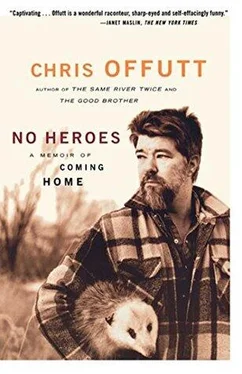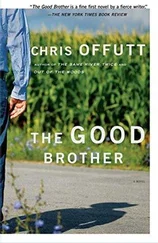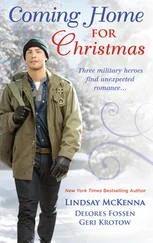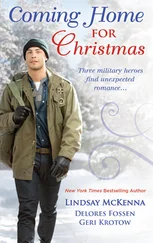I drove home to my family, kissed my wife, and wrestled with my kids. We watched a video together. I thought about Lena the whole time. I imagined that she and I were at the old Trail Theatre downtown. I pretended to yawn and stretch, leaving my arm on the back of her seat, and when she didn’t mind, I kissed her. It was our first kiss, our only kiss, merely a peck, but it counted — an infinity of first kisses in the darkness expanding through the universe.
At the end of the movie, Rita and I put the kids to sleep and lay in our bed — the same bed where I’d wrestled with my boys, the same bed we’d all four slept in like cats through the cold Montana winters, the same bed Arthur and Irene had given us when Sam was born. I thought of how fortunate I was to have both left the hills and made it back home.
I didn’t know that people were constantly inviting Rita to their church. I didn’t know that she politely thanked them and explained that she was Jewish. I didn’t know that each time this happened, the person’s invariable response was, “Oh, I’m sorry.”
Mosbach is an old city, maybe eight hundred years old. A beautiful German city in the area they call the Black Forest. There is an underground factory and the Allies start bombing raids. I have a show every night. I’m sitting in the window and watching Mosbach being bombed. I’m extremely happy. It’s a beautiful night and then you get the airplanes coming. Sirens are ringing air raid and everybody goes into the cellars. I don’t mind. I love it. There are rows of bombs going down. The city got hit and everything is burning. We are engaged now in Götterdämmerung.
They missed the factory and hit the city, but there was nothing there. It was just civilian population. We had to clean up the mess, rubble and fires burning and the dead. The men were gone to fight and the old people were already dead. Only women and children were left. It turned my stomach. Women with no arms, babies without heads.
The first time we cleaned up I don’t know what to feel, because when I saw the bombs coming I was happy about it. Then I saw the result and I didn’t feel any pleasure at all. I could have gone anywhere, I could have escaped, but I wanted to help. I was very happy when somebody was taken out of the rubble. When I found someone dead, I didn’t feel so good.
It took a few weeks to clean up, and the people were feeding us. They were grateful. I got butter and milk, things I never thought I would see again. They forgot that we were prisoners of war. They behaved like friends. We did a lot of laughing. We were always joking around. It seemed to me we lived a very normal, crazy life. We were laughing, we were singing. Then they realized that we were Jewish prisoners and they became hostile. They threw things at us. They told us to dig in certain places where there were time-delayed bombs. No more food they give us.
After we clean up, back to the camp. It’s peculiar living when you know you’re gonna die because you’re so sick and there’s no medication, and in addition, every so often, the Americans bomb it. We have casualties in the camp and who gives a damn, because we are all dying.
There are guys holding their pants up because all the pants were too big. We call them Muselmann. Walking dead. They’re still walking, but they’re dead already. Just a skeleton. The only thing you see is bones that still walk around somehow. They are holding on to anything to walk.
One night one of the bosses brought in a force of Polish slave labor women. They had bread and potatoes and sausage. You have to give them something for that food. You had to give them sex. The Serbs and Russians, they liked to screw but they had to save their strength for work. So they said to the women, I’ll sleep with you on one condition. You give me a nice piece of sausage.
The women lived in France for so long, they thought that we know something about their family. They hadn’t seen a man in months. They are doing it for food while getting some news of their husband. It was business, strictly business. Nothing personal. If they are caught, they’re dead. And the Muselmanner are going back there, holding their pants up, willing to perform sex for food. The Serbs were tops. They could do it any time, anywhere. They brought back the biggest amount of food.
Me, I decided not to shit. I thought that if I kept it longer in me, my body would get more nutrition. I held it until there was no more to get. Then I let it go. There was never much.
Irene Goes to a Better Camp
People were chosen to go to a new place, and I went to Leipzig, a German town that was also an ammunition factory. It wasn’t so terrible because they were not killing people on the spot.
Leipzig was very clean, no lice. Terrific camp. Almost not like a concentration, more like a slave-labor camp. A lot of showers for us. It was really more humane. Food was soup and water and bread once a week. But more bread at this camp.
I did a little bit something very sweet in Leipzig. I started to look at a Yugoslavian girl, very sweet. She always smiled when I was passing, so I borrowed from somebody a piece of pencil and paper and I wrote a note to her and I gave it in the hand when she was passing. I wrote, I don’t have a family here, but I want you to be my family. And she was writing to me what she was thinking. The same paper and pencil we passed. A half a year we wrote. We never talked. Never. We just wrote the notes. She wrote to me and I wrote to her. I was waiting already, looking forward to when she would give me a note. I never saw her again.
Tilden Hogge and Poppin Rock
Our children attended a grade school with the improbable name of Tilden Hogge. Rita visited the school every day to help with classes in reading and music. Sam and James walked half a mile to catch a bus that carried them ten miles over a narrow winding road known throughout the county for disastrous car wrecks. They spent an hour and a half in transit.
The principal was a former high school football coach who never had a winning season. As sports editor for the school paper, I attended all the games, and sometimes the coach drove me home afterward, long rides through the dark woods. His compensation for a lifetime of county service was command over a grade school. All the teachers were women. They wore dresses to school, because, as one told me, the principal preferred to see them in formal clothes.
One day Sam came home extremely upset. I assumed he’d been in a schoolyard battle and prepared to explain the duality of how fighting is bad but sticking up for yourself is good. I was wrong. He hated school. He was bored and unchallenged. No one was allowed to ask questions. The gym teacher punished kids by refusing to let them drink water or urinate during gym class. Lunch recess lasted fifteen minutes, the only break in seven hours.
I asked Sam if there was anything else.
He shrugged.
“Are you mad about something,” I said.
He nodded.
“At me,” I asked.
He nodded, staring at the floor.
“It’s okay to be mad at me,” I said. “But you should tell me why.”
He looked at me full on, his eyes damp and scared.
“Because you brought me here,” he said.
I hugged him hard, my mind overwhelmed by a crush of memory — years of hating school, the boredom that turned me into a discipline problem, the anger I had at living in a place with no art classes. In twelve years of education, we never had a field trip.
The next day I visited Tilden Hogge to speak with Sam’s teacher, and quickly ran afoul of the rules. Parents were not allowed to enter a classroom, even after school. A painted stripe on the floor was a barrier over which no one could cross, similar to minimum security prisons. Talking with a teacher required an advance appointment made through the principal’s office.
Читать дальше












